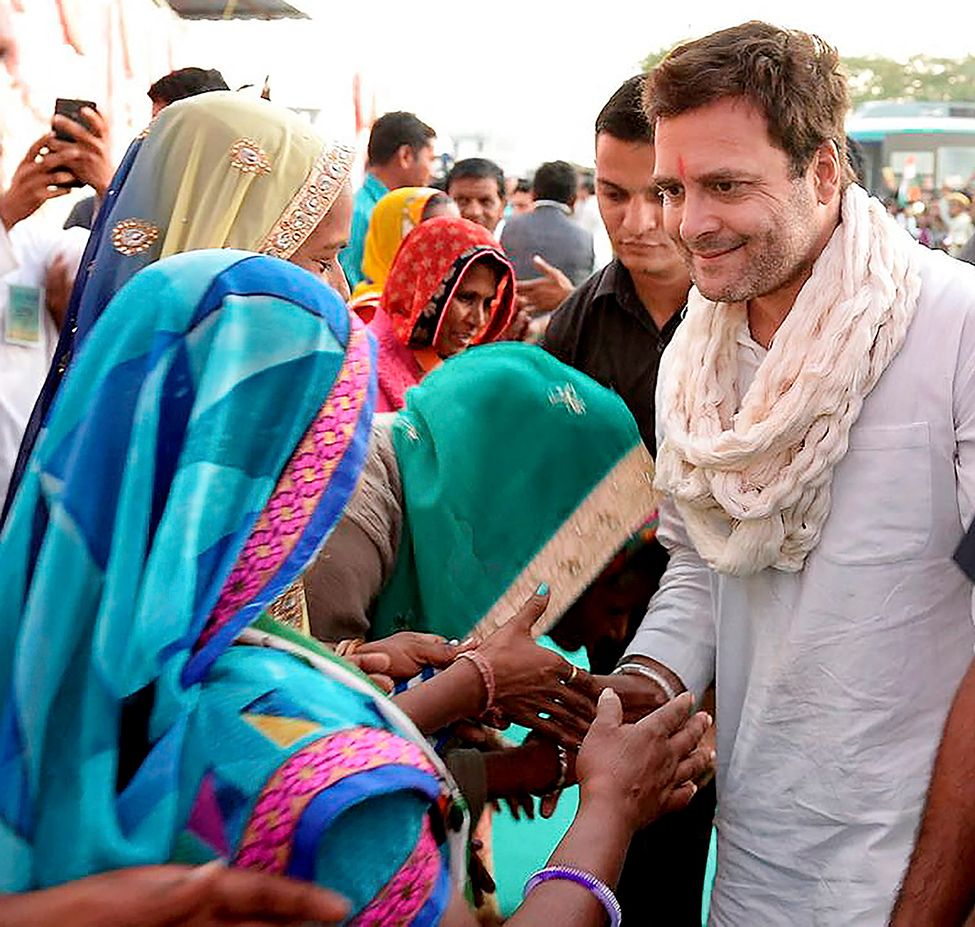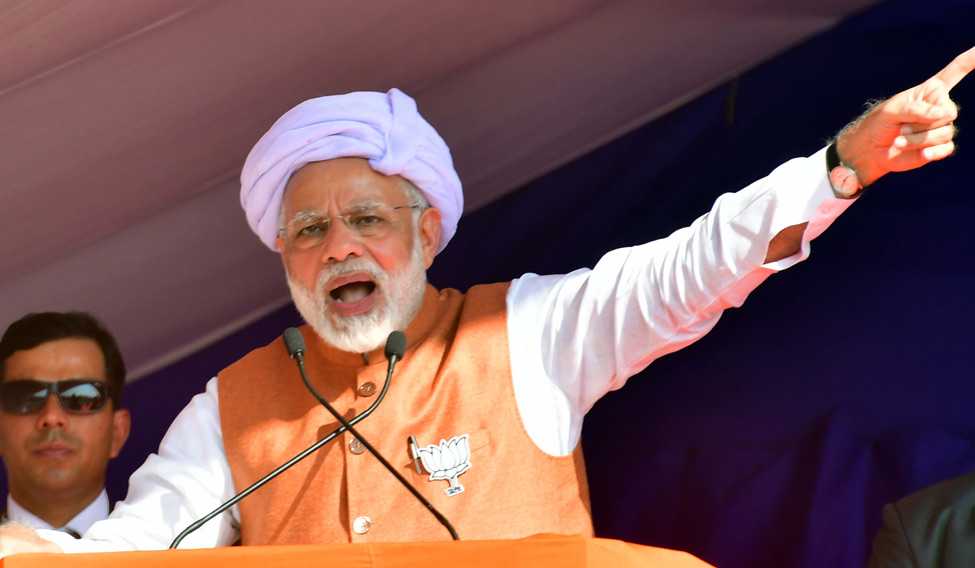On December 15, when the much-delayed winter session convenes, Rahul Gandhi will enter Parliament as the new Congress president. Whether he would be able to retain a spring in his steps will be revealed only three days later, when the results of the Gujarat assembly elections come out. The Congress will sound a triumphant note if the BJP’s tally is reduced, and might even overlook a likely reversal of fortunes in Himachal Pradesh.
It is perhaps for the first time since his party’s humiliating defeat in the Lok Sabha polls in 2014 that Rahul appears to be at ease engaging with people, delivering speeches and taking decisions. He has moved from being a figure of derision to a leader who is being heard and talked about. And, his makeover has been noticed across Gujarat.
He is up against two formidable foes who are the masters of the game. Prime Minister Narendra Modi and BJP chief Amit Shah, who earned their spurs in Gujarat, have moved political cavalries to retain their bastion. As ground reports from the state reveal, it is a tough fight.
Two different scenarios are envisaged. If the BJP wins, or is even in a position to form the government, its machinery will make it look like an emphatic victory. Under this scenario, the BJP will retain its winning team in Gujarat. In case of a less emphatic win, the Modi-Shah duo could follow the Goa example by appointing a new chief minister to give people a sense of change.
If the BJP does not do well or loses the election, which even its rivals feel is a distant possibility, all hell may break loose. It will send a message of Modi and Shah’s diminished appeal. This would be tricky as elections in eight states—including Madhya Pradesh, Chhattisgarh and Rajasthan—will be held next year. The BJP will find it tough in taking its message across and convincing people in the states it has been in power.
Beyond electoral politics, its impact may be felt on policy formulation and governance. Modi had made electoral results a barometer of the success of his policy decisions. Demonetisation was hailed as a success after the BJP’s victories in Uttar Pradesh and Uttarakhand. The Goods and Services Tax has caused widespread resentment among traders in Gujarat. If the results are not in favour of the BJP, it may impact future policy decisions.
The BJP is counting on the tweaks in the GST to turn the tide in the party’s favour. “We have spoken to people in Surat. I have been there thrice. We changed rates in the GST. Most of the traders have benefited now. Though a few days are left for the elections, I think people have made up their minds. Anyone can draw inferences based on their analysis, but we think it’s done. It’s in our favour,” Petroleum Minister Dharmendra Pradhan told THE WEEK.
Gujarat results are unlikely to change anything in the BJP. A success will only increase the Modi and Shah charisma; but even a loss would not dent their hold over the party.
But the BJP is not expecting to lose. “Look at the Uttar Pradesh civic elections. People have again reposed faith in us. It will now impact the Gujarat elections,” said Dinesh Sharma, deputy chief minister of Uttar Pradesh. “Gujarat elections have also shown people who work keeping in mind the religious values. It has even forced the Congress and Rahul Gandhi to do so. This means acche din.”
The campaigning in Gujarat has had a distinct flavour. Rahul has visited temples with a vengeance and was declared a janeu dhari Hindu by his partymen. The BJP’s aggressive hindutva push has only made the other political parties follow the path. Conspicuous by its absence has been any mention of the communal riots in 2002.
Gujarat provides the Congress an opportunity to turn the narrative in the run-up to the Lok Sabha elections in 2019. Rahul’s campaign has largely been based on the issues of lack of employment, the impact of GST and demonetisation on small and medium businesses, and the problems faced by farmers. He also highlighted the high-handedness of the BJP government in its dealing with Patidar protesters, the atrocities on Dalits, and the dissatisfaction among backward castes.
For a change, the Congress has a strategy to take on Modi this time. It involves attacking his government on the issue of development and staying clear of communal issues. There is an effort to rectify the perception of appeasement of minorities, which is said to have alienated the majority community from the party. “A major challenge before us is to script an effective counter-narrative that can replace the narrative that is being propagated by the ruling dispensation,” said Congress leader Milind Deora.
The outcome of the Gujarat election would determine the future of this strategic shift. The Congress’s aim would be to wrest power from the BJP in Madhya Pradesh and Chhattisgarh, where the saffron party unseated it 15 years ago. In Rajasthan, the Congress under Sachin Pilot has been carrying out an aggressive campaign against the Vasundhara Raje government.
Rahul filed his nomination for the election to the post of Congress president on December 4, and the political backdrop was unmistakably the assembly elections in Gujarat. Leader after leader, who turned up at the Congress headquarters in Delhi, praised his campaign in Gujarat. He will take charge as Congress president in the midst of elections, which is significant because the assessment of the party is that the state could well prove to be a turning point in the national political narrative.
If the BJP wins the election, however, it will be termed as another Rahul failure.
 At ease: Rahul Gandhi during his campaign in Dahod | PTI
At ease: Rahul Gandhi during his campaign in Dahod | PTI
Getting an alliance in place would be crucial for the Congress in the Lok Sabha elections in 2019. It was the motley group of regional parties put together by Sonia in 2004 that helped the Congress defeat Atal Bihari Vajpayee. A win in Gujarat would help Rahul in reaching out to allies with more credibility. He has been engaging with leaders like Akhilesh Yadav and Tejashwi Yadav. “Given that even at the height of power and popular appeal, Modi won only 31 per cent vote, if we are able to bring to a common platform the remaining 69 per cent who did not vote for him, we will be able to overthrow the current regime,” said senior Congress leader Mani Shankar Aiyar.
A significant phenomenon being played out in Gujarat is the assertion of caste. The emergence of leaders like Hardik Patel, Alpesh Thakore and Jignesh Mevani has shaken the hindutva project in the state. “We have to think how the narrative of caste has come to play here, whereas it is going down in states like Uttar Pradesh and beyond. Is Gujarat going back in terms of social changes? Unlike in other states, everything Gujarati was a matter of pride. We need to bring it back,” said a BJP strategist. Dinesh Sharma, however, dismissed the caste leaders as the B-team of the Congress.
As of now, everything will depend on who is able to bring out the voters to the polling booth. The BJP is an 800-pound gorilla here, with massive presence at the booth level. The Congress can only hope the fence-sitters will come out and vote for it.
Narendra Modi
Places visited: 19
Distance covered: 4,500km*
Prominent region: Saurashtra
*approx.
Rahul Gandhi
Places visited: 30
Distance covered: 2,800 km*
Prominent region: Saurashtra
*approx.






